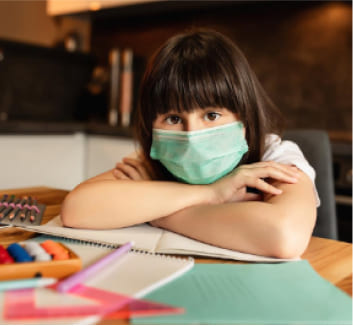After-effects of Covid on Your Child’s mental health

Mental and Physical Development
When it comes to the after-effects of Covid on your child’s mental health, it is important to understand that both physical and mental development were impacted. For example, if your child was already dealing with anxiety or depression before the pandemic, they may find that their symptoms have worsened. It is also important to remember that even if your child doesn’t have a pre-existing mental health condition, they may still be struggling emotionally due to the stress of the pandemic.
Side Effects of Covid on your child’s mental health
Anxiety: Many children feel anxious about returning to school or being around others again. They may be worried about getting sick or catching the virus.
- Depression: The pandemic has been stressful for everyone, and children are no exception. Some children may be dealing with depression as a result of the pandemic.
- Trauma: For some children, the pandemic has been a traumatic experience. They may have experienced loss or seen things that have scared them. This can lead to long-term mental health issues such as PTSD.
- Behavioural problems: Some children may exhibit behavioural problems after the pandemic. This can be due to the stress of the situation or because they’re struggling to cope with all the changes.
- Difficulty concentrating: The pandemic has been a very disruptive time for everyone. This can make it difficult for children to concentrate on schoolwork or other tasks.
- Virtual Autism
- Lack of Communication skills
Ways to cope with your child’s mental anxiety
Here are some ways that you can help your child cope with their mental anxiety:
Here are some ways that you can help your child cope with their mental anxiety:
- Encourage them to express themselves: Whether through writing, drawing, painting, or any other art form, expression can be very therapeutic for children. It can help them to get their thoughts and feelings out in a healthy way.
- Talk to them about their worries: This may seem obvious, but sometimes simply talking to your child about what worries them can help ease their anxiety. They may feel better just knowing they can talk to you about anything.
- Help them stay active: Exercise is a great way to help reduce stress and anxiety in children and adults. Getting outside and getting some fresh air can also be very helpful.
- Limit their exposure to news and social media: It is important to keep up with the news to stay informed, but it is also important to limit your child’s exposure to it. Too much news can be overwhelming and can add to their anxiety. The same goes for social media. Help them to find a balance between staying informed and not letting the news consume them.
- Seek professional help: If you feel your child’s anxiety is severe or they are having trouble coping, it may be time to seek professional help. A therapist or counsellor can help them to work through their anxiety healthily.
- Engage with the children: Read books with them and to them, take them on treks and outings that are age appropriate and engage them in fun physical activities but allow bonding to develop between you and the child.